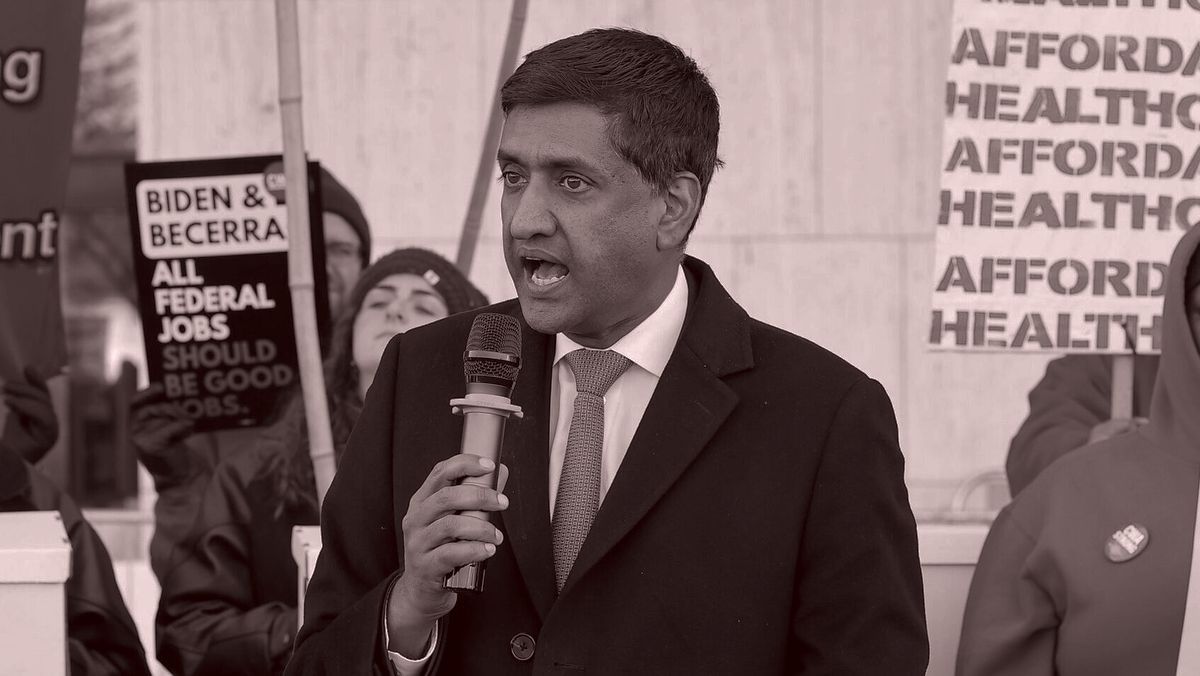Welcome back to The Best & The Brightest. I’m Peter
Hamby.
Tonight, a postcard from somewhere in American exurbia, where angry Democrats confronted their newfound impotence at a town hall hosted by Representative Ro Khanna. He was traveling through G.O.P. districts, trying to reassure California voters that not all is lost as Donald Trump reigns supreme in Washington. But my conversations with those same voters revealed profound anger, despair, and little hope that directionless Democrats can save
them.
|
|
|
App store parental approval can keep teens safe online.
Today, teens can download any app – even ones parents don’t want them to. Federal legislation that puts parents in charge of app downloads could change that, helping keep teens safe.
That’s why Instagram supports federal legislation requiring app store parental approval and age verification for teens under 16.
Learn more.
|
|
|

|
Abby Livingston
|
|
- The A.O.C.
metamorphosis: Alexandria Ocasio-Cortez is continuing her evolution into a bona fide Democratic Party leader. Yes, she and Bernie Sanders just barnstormed five states, drawing massive crowds with their “Fighting Oligarchy” tour. But according to internal party records I obtained, Ocasio-Cortez is playing the D.C. game, too, quietly taking the lead on party fundraising. In January, A.O.C. paid off her entire assigned dues sum of $275,000, which
members donate to embattled colleagues in tough races.
This is unusual in many ways. To begin, most members are financially exhausted from their latest campaign, and need time to rebuild their coffers. But it’s also a signal that A.O.C. wants to be viewed as both a real loyalist and a real player—alongside Jamie Raskin, who paid off his assigned $333,000 dues, and Nancy Pelosi, who contributed $500,000 from her campaign to the D.C.C.C. and then
directly raised $1.2 million for the committee.
This is quite the volte-face for A.O.C., who never paid dues before last year, which was such a point of contention within the party that The New York Times ran a story in the print edition when she finally made good on her target. It wasn’t that long ago that she
flat-out boycotted supporting the D.C.C.C., taking issue with its function as an incumbent protection program racket.
It’s almost disorienting to reread the coverage of A.O.C. from five years ago when her political war with Pelosi was raging. But in this new era, even some of her fiercest critics from that time, including high-profile moderate Democrats, give her credit for maturing, and admire her leadership while the party stumbles through its post-Biden hangover. By
paying off her dues so early, she’s not just sending a signal that she wants to climb the ranks of leadership—she’s also setting an example.
|
|
|
Ro Khanna, the ambitious Silicon Valley congressman and Bernie
acolyte, just wrapped a three-city listening tour to rally despondent Democrats, let them vent, and offer a little hope. Mostly, though, he wants them to face up to the hard work ahead. “We can speak out, but there’s not much we can do beyond organizing and mobilizing in districts and being vocal,” Khanna told me. “And that’s the reality of the situation.”
|
|
|
There was a whiff of optimism—maybe even hope—in the air when I showed up to
witness the latest stop on Ro Khanna’s “Benefits Over Billionaires” tour in Norco, California, on Sunday. Here in the exurban sunshine were 1,000 or so Democrats, in a district represented by a Republican who’d been avoiding town halls in the wake of all those DOGE cuts, gathering on a weekend afternoon to hear from an only sort-of-famous Democratic congressman. For many of these Democrats—and they were all Democrats—it was the first time any of them had gathered
together in person since last November’s defeat up and down the ballot.
On its face, Khanna’s three-city California tour (in districts not his own) was about protecting government programs like Medicaid and SNAP from possible Republican budget cuts. He raised the specter of hospitals closing, people getting kicked off their insurance, and kids with disabilities losing funding from the Department of Education. But much like Bernie Sanders’ “Fighting Oligarchy” tour,
Khanna’s campaign-style visit was also an effort by an ambitious national Democrat to plant a flag outside the Beltway and show angry voters that at least some politicians are listening. “We have little power, but we’ve got to maximize that power,” Khanna told me. “Giving people direction, making them feel heard, making them feel they can be part of something, is how we translate this anger into a positive energy.”
|
|
|
States are taking action to protect teens online. Congress should, too.
Today, teens can download any app – even ones parents don’t want them to. Federal action putting parents in charge of teen app downloads can help keep teens safe online.
Twelve states are considering legislation requiring app store parental approval and age verification. It’s time for Congress to do the same with federal legislation.
Learn more.
|
|
|
His visit to Southern California’s sprawling Inland Empire didn’t solve Democrats’
main problem—that they’ve been entirely boxed out of power in Washington—nor was it a sign of some far-reaching revolt by the citizenry against Trump. It was only an echo of the widespread anti-Trump revulsion in 2017 that seemed to permeate the country throughout his first term. But at a moment when angry Democrats are yelling at their leaders to “Do Something!”… well, it was something.
Several dozen union members showed up from SEIU Local 2015, wearing their trademark
purple t-shirts. Pod Save America hosts Jon Favreau and Tommy Vietor were there warming up the crowd. One man dressed in a chicken costume, a goofy indictment of Ken Calvert, their longtime G.O.P. congressman who hasn’t held an in-person town hall there since Trump came back into office. There were preprinted signs saying “Hands Off Medicaid!” and crafty homemade signs, including one that portrayed Elon Musk as Adolf
Hitler. The event was a much-needed group therapy session for these Democrats, who lost the White House last year as well as a contested race for their congressional district. They did, as Khanna said, want to be heard—and Khanna got an earful.
Riyadh Cooper, a 45-year-old combat veteran in a Dodgers hat, took the mic and demanded to know why Democrats were letting Trump run wild. “I want to know why in the world the Democratic Party hasn’t fought yet,” he said. “When
Barack Obama was elected president, a room full of Republicans sat down and said that they would not let him pass a thing. Why in the world have our Democratic leaders like Chuck Schumer allowed anything to pass? You’re the only Democrat standing here, so I got to ask.”
That was one of the more polite inquiries. Khanna went on to face other versions of the same question: Why are Democrats so weak? Why can’t they do more? Why do Republicans get to play
by their own rules? As the town hall dragged into its second hour, whatever sense of optimism and partisan bonhomie I initially detected gave way to some combination of rage and despondency, as this chorus of like-minded people realized that there just isn’t much they can do.
It was as good a window as any into the mood of the Democratic base these days, and the overwhelming contempt for its leadership. “The Democratic Party just can’t get its shit together,” said Vickie
Dunlap, a retired Army command sergeant major. “What are you guys doing in Congress to unite and bring us together as a people in this country? Why are our representatives allowing this continued divisiveness? If they snuff the Democratic Party out to nothing, the rest of us ain’t got a snowball’s chance in hell.”
Khanna, who has designs on statewide or even national office one day, indulged their anger. He condemned Schumer for acquiescing to Republicans on a funding bill that
prevented a government shutdown earlier this month. “The old guard needs to go,” Khanna said, teeing up one of his biggest applause lines of the day: “Chuck Schumer made a huge mistake.” But he acknowledged, time and again, that right now Democrats can do little other than organize in their communities, pressure Republican politicians to vote a certain way, and wait until the next election. “The reality is that we need to mobilize like we’re doing here in every red district in the country. … We
need to up our game,” Khanna said. “Two hundred and twelve House members and 47 senators are not enough to stand up against this assault on our democracy. It’s going to take millions of us starting in places like Norco to stand up unified. And we know, from our country’s history, that’s what succeeds.”
Khanna sounded more downbeat when I asked him about the dynamic after the event. Fittingly, he had just left the speaking stage to the sound of Radiohead’s “Idioteque”—the gloomy
Bush-era song about a dark future ravaged by humanity’s equivocations in the face of climate change. Whether the song choice was intentional or not, the lyrics fit the afternoon’s mood: We’re not scaremongering. This is really happening, happening. I asked Khanna whether he thought the public therapy session was helpful. What can you possibly say to angry Democrats when their party has zero juice in Washington? “We can speak out, but there’s not much we can do
beyond organizing and mobilizing in districts and being vocal,” Khanna told me. “And that’s the reality of the situation.”
|
I was more interested in hearing from Democratic voters than from Khanna, mostly
because I had already interviewed him a few months earlier about his vision for restoring the Democratic Party’s appeal in red and purple states, part of which included what he was now doing in Norco—showing up in G.O.P. districts to listen and learn. But it became very clear, very fast, that the Democrats who showed up to hear him speak were not at all
interested in breaking bread with Republicans. Most Democrats I spoke to said they wanted to fight, but they don’t really know how.
“What’s going on right now is just scary as shit,” said Liz Bock, who drove in from Brea in nearby Orange County. “We are just all looking for someplace to go. We are looking for something to do. We just feel like we have to get something going.” Like many Dems at the town hall, Bock had come from another congressional district to see Khanna.
She, and others I spoke to, had simply been searching online for something—anything—that fellow Democrats might do to stop Trump.
|
|
|
The audience was mostly white, and older, too. I got the impression that these
were not casual voters wandering in off the street, but only the most highly engaged Democrats. Several people said they knew Khanna—almost always available to the media—from MSNBC or CNN. Others said they heard of the event when it was mentioned on Pod Save America.
Vietor, the co-host of that podcast, distilled the anxiety of the day in his remarks introducing Khanna. This time feels a little more hopeless than it did back in 2017, Vietor said, but at least the gathering was a
start. “I think that showing up is so important in this moment, because I think everyone here is probably having the same version of the same conversion,” he offered. “Why do things feel so bad this time? Why is there no energy? Where are the protests? Where are the marches? I feel it too.”
Jane Kim, the California director of the Working Families Party and a former San Francisco supervisor, said progressives have no option but to gather, organize, and keep pushing
forward. “The fact that this many people came out on a Sunday in an off-year, for a congressman no one really knows around here—that just shows that there’s a hunger from people who want to do something,” she told me. Kim, a former field director for Bernie Sanders, also said that Democratic leaders bear some of the blame for their party’s newfound irrelevance. “I think where the Democrats failed is, maybe just being against Trump wasn’t enough,” she said. “People actually wanted a vision.
People want to hear things like, one job should be enough. That we should raise the minimum wage. That public college should be free, that we want Medicare for All. We actually need to lean into the economic message, not away from that.”
Kim was looking on as two millennial men, roommates who had driven over from Temecula, both pressed Khanna on why Democrats seem committed to playing by old rules that no longer apply in the Trump era, as the administration flouts the judiciary and
ignores congressional authority. “The guardrails are off,” said one of them, Josh Siegel. “I’m not confident we’re going to make it to 2028 with a normal democracy. Maybe not even 2026, God forbid. My question is, are you guys prepared to do what it’s going to take?” Khanna defaulted to his answer about organizing and mobilizing.
Afterward, I caught up with both men and asked whether they were satisfied with Khanna’s responses. They liked him, but were left wanting more.
I was surprised to learn that both of them—Siegel and his roommate Tyler Smith—had voted for Trump in 2016 and 2020, but had since turned on him. “It was all lies,” Smith told me. I suspected Siegel and Smith’s questions were referring to the prospect of political violence, and I asked them as much. “The other team, they’re not playing by the legal rules anymore,” Smith said of Republicans. “They’re not playing by the constitutional rules anymore. And so what our founding
fathers did was, it came to physical violence, it came to rebellion in a physical, actionable way. And so I was asking him, do we need to start talking about that?” Then Siegel interrupted his friend. “It’s the ‘When they go low, we go high’ mentality. That’s over,” he said. “At the very least, we got to meet him in the dirt.”
On the way out of the event, I caught up with a retired couple from Riverside, Terry Toles and Gail Paulsen. They said they
respected Khanna, and appreciated his willingness to just show up and have a dialogue, even if he represented a district hundreds of miles away. I asked Paulsen, who was wearing her daughter’s SEIU t-shirt, what felt different about these first months of Trump II. “I’m more depressed now, because I think what he’ll do now will be worse than what happened in 2017,” she said. She added that it feels like more Democrats have just tuned out since last year’s loss. “I do phone banking,” she said,
“and a lot of people do not want to hear. They don’t want to know, and it’s a shame.”
|
|
|
Join Emmy Award-winning journalist Peter Hamby, along with the team of expert journalists at Puck, as they let
you in on the conversations insiders are having across the four corners of power in America: Wall Street, Washington, Silicon Valley, and Hollywood. Presented in partnership with Audacy, new episodes publish daily, Monday through Friday.
|
|
|
Unique and privileged insight into the private conversations taking place inside boardrooms and corner offices
up and down Wall Street, relayed by best-selling author, journalist, and former M&A senior banker William D. Cohan.
|
|
|
Need help? Review our FAQ page or contact us for assistance. For brand partnerships, email ads@puck.news.
You received this email because you signed up to receive emails from Puck, or as part of your Puck account associated with . To stop receiving this newsletter and/or manage all your email preferences, click
here.
|
Puck is published by Heat Media LLC. 107 Greenwich St, New York, NY
10006
|
|
|
|

























